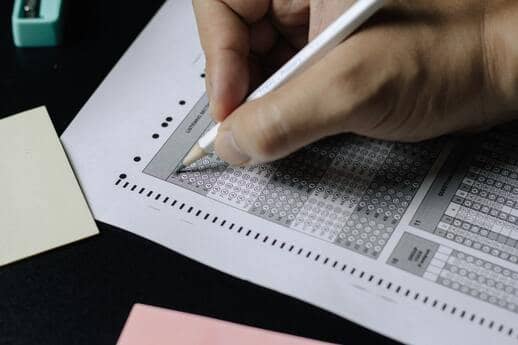Tests are everywhere, from a standardized test required for becoming a certified teacher to high school entrance exams, from college admissions to job interviews. Most of these tests have been around for years, with some having been administered since the early 1900s in the United States. Tests are used to gauge a student’s understanding of a particular subject, skill set, or reasoning abilities, making them important tools in education and determining entrance into higher education and some careers.
What Are Standardized Tests?
A standardized test is a way to determine a person’s abilities, skills, and knowledge. Standardized tests are tests that are administered and scored in a consistent, or “standardized” manner.
Standardization allows for fair comparisons of individuals or groups because everyone is given the same test under the same conditions. Standardized tests are typically designed to measure a student’s knowledge and skills in specific areas such as math, science, history, English language arts, and foreign languages.
The SAT is an example of a standardized test. It measures verbal reasoning skills, mathematical problem-solving skills, and writing skills among other things. The ACT is another example of a standardized test that measures how well students have mastered high school subjects in English, mathematics, and reading. It’s typically taken by juniors and seniors in high school.

Types of Standardized Tests
There are many types of standardized tests that are used these days. These tests include college entrance exams, high school exit exams, intelligence quotient (IQ) tests, achievement tests, and aptitude/achievement tests. The most common type of standardized test is the achievement test which measures what students have learned during their time in school.
College Admissions Tests
Most colleges in the United States require a standardized test score to be submitted as part of a college application. The most widely used standardized test is the SAT and the ACT exams. These tests are given seven times each year. The months you can take the SAT are March, May, June, August, and October through December. College testing is designed to indicate whether a student is prepared for course work at the college level, as well as completing their college degree program.
Graduate School Admissions Tests
Some graduate schools require that applicants take a standardized test before being accepted. This is something many universities have in common in the United States. The most common tests that are required as part of the application process and used as a measurement of success in graduate school are the Graduate Record Examination (GRE) and the Graduate Management Admission Test (GMAT). These tests are given at private testing centers and take about three hours and forty-five minutes to complete. GREs are often required for master’s degrees that are not business-related. For anyone hoping to go to business school for their MBA degree, you’ll likely be required to take the GMAT as part of your MBA application.
For the GRE, the test is given in six sections. The GRE sections include verbal reasoning, analytical writing, quantitative reasoning, and an unidentified section that you’ll need to complete.
The GMAT consists of four sections: a written analysis test, quantitative reasoning, verbal ability, and integrated reasoning. The test usually takes no longer than four hours to complete and is a computer-adaptive test. Computer adaptive tests monitor your answers as you progress through the test and will adjust the level of difficulty based on your previous answers.
In addition to the GMAT, students can also take practice tests like Graduate Program Admission Test (GPAT) and the Advanced Management Admission Test (AMAT). These tests will help prospective students prepare for the GMAT by testing business knowledge and critical reasoning skills.

Specialized Standardized Tests
If you want to go to law school or medical school, you’ll need to take a specialized test designed specifically for those schools.
Law schools require that you complete and pass the LSAT. The LSAT is a standardized test that measures reading comprehension, logical reasoning, and analytical writing skills. It is administered four times a year at designated testing centers. These scores are good for five years. The LSAT is designed to measure skills that are important for success in law school and generally necessary for success as a lawyer.
If you aspire to become a medical doctor, you’ll need to take and pass the MCAT. The MCAT is a standardized test that is required for admission to medical school in the United States.
Alternatives to Standardized Tests
There are several alternatives to a standardized test. A student might choose to take an aptitude test or a personality test to measure intelligence. There are also school-based assessments, such as the Iowa Tests of Basic Skills, or the California Achievement Tests, that can be replaced by elements of a standardized test. Finally, there are administered tests that allow students to express themselves creatively.
Aptitude Tests
Aptitude tests measure a student’s intelligence or ability in a certain area. These exams can be administered individually or in groups. They are most often used in preparation for post-secondary education.
Personality Tests
Personality tests measure a student’s emotional, social, and personality traits. An organization usually gives the tests, such as a teacher, coach, or professor. Research has shown that the type of test is less important than the person administering it. A young person who takes a test with a teacher should make more favorable scores than a young person taking the test with their peers. The tests usually take place in a classroom setting, so students are free to respond to the instructions and interact with their peers. Students can also allow their personality traits to be known, contributing to more accurate results for future academic and career planning.
School-Based Assessments
School-based assessments are used for a number of reasons. These exams often replace standardized tests as an alternative to them to give students more freedom. Usually, a combination of individual, group, and open-ended questions are given to students. The results of these exams can be used to develop a future curriculum based on the strengths and weaknesses of the student population in that class. The results can also measure the class’s progress throughout the school year.

Affordable Study Guides for Standardized Tests
Here’s a list of affordable study guides for various standardized tests, organized by test type:
SAT/ACT Test Prep
- “The Official SAT Study Guide” by The College Board
- Price: $20–$30
- Features: Real SAT tests, explanations, and strategies directly from the test maker.
- “The Princeton Review’s Cracking the SAT”
- Price: $15–$20
- Features: Practice questions, strategies, and full-length tests.
- “Kaplan’s SAT Prep Plus”
- Price: $20–$25
- Features: Comprehensive review, 5 full-length practice tests, and online practice tools.
- “ACT Prep Book 2024-2025” by Mometrix Test Preparation
- Price: $20–$25
- Features: Practice questions, detailed explanations, and test-taking strategies.
- “The Official ACT Prep Guide”
- Price: $25–$30
- Features: Full-length tests from ACT, Inc. with answers and explanations.
GRE Test Prep
- “The Official Guide to the GRE General Test” by ETS
- Price: $25–$30
- Features: Real GRE questions and a detailed overview of the test.
- “Manhattan Prep GRE Strategy Guides”
- Price: $30–$40 (bundle)
- Features: Subject-specific books with strategies, practice problems, and test-day tips.
- “5 lb. Book of GRE Practice Problems” by Manhattan Prep
- Price: $20–$25
- Features: 1,800+ practice questions covering all test sections.
GMAT Test Prep
- “The Official Guide for GMAT Review” by GMAC
- Price: $25–$30
- Features: Real GMAT questions with explanations and online access to practice tests.
- “Manhattan Prep GMAT Complete Strategy Guide”
- Price: $35–$45 (bundle)
- Features: Comprehensive guides for all GMAT sections with practice problems.
- “Kaplan’s GMAT Prep Plus”
- Price: $25–$30
- Features: Full-length practice tests and strategies, online and offline access.
LSAT Test Prep
- “The Official LSAT PrepTest” by LSAC
- Price: $10–$20 (each)
- Features: Real, past LSAT exams with explanations.
- “LSAT Prep Plus” by Kaplan
- Price: $25–$30
- Features: Practice tests, strategies, and access to online resources.
- “LSAT Trainer” by Mike Kim
- Price: $20–$25
- Features: Detailed strategies and 200+ practice questions for logical reasoning, reading comprehension, and games.
MCAT Test Prep
- “The Official Guide to the MCAT Exam” by AAMC
- Price: $25–$30
- Features: Test strategies, explanations, and official practice questions.
- “Kaplan MCAT Complete 7-Book Subject Review”
- Price: $40–$50 (bundle)
- Features: Covers all test subjects with practice questions and online access.
- “Examkrackers MCAT Study Package”
- Price: $30–$40 (individual subjects)
- Features: Subject-specific reviews with strategies and practice questions.
TOEFL/IELTS Test Prep
- “The Official Guide to the TOEFL Test” by ETS
- Price: $20–$25
- Features: Real test questions, scoring guides, and online access to practice tests.
- “Kaplan’s TOEFL iBT Prep”
- Price: $20–$25
- Features: Full-length practice tests, online resources, and detailed explanations.
- “The Official Cambridge Guide to IELTS”
- Price: $25–$30
- Features: Practice questions for both Academic and General Training versions.
- “Barron’s IELTS Superpack”
- Price: $30–$35
- Features: Includes practice exams, audio tracks, and test strategies.
CPA Test Prep
- “Wiley CPAexcel Exam Review Study Guide”
- Price: $30–$40 (per section)
- Features: Detailed review and practice questions for each section of the CPA exam.
- “Becker CPA Review Course”
- Price: $20–$30 (individual subjects)
- Features: Practice questions, explanations, and simulated exams.
NCLEX (Nursing) Test Prep
- “Saunders Comprehensive Review for the NCLEX-RN Examination”
- Price: $35–$40
- Features: Comprehensive review of nursing topics, practice questions, and test-taking strategies.
- “Kaplan NCLEX-RN Prep Plus”
- Price: $25–$30
- Features: Practice questions, detailed explanations, and online resources.
This list covers a wide range of standardized tests and includes affordable, well-reviewed study guides. Many of these books are also available as e-books, which may further reduce costs.
Options for Adults Who Never Took the SAT
There are several options for adults who have never taken the SAT test. The first option is to take the ACT test as an alternative to the SAT if some or all of the schools you are applying to require standardized test scores as part of their admission policy. Another option is to choose a college that doesn’t require SAT or ACT scores. Many schools are either removing this requirement or waiving it for those who have work and life experience. The last option is to consider a community college or technical school, then transfer to a 4-year college.
Standardized Test Scoring
The scoring of standardized tests is typically done by humans, but there is an increasing trend for this to be done by automated systems as well. This shift is due to the high volume of standardized test scoring and the need for consistency in scoring throughout different states and districts. Standardized tests are scored in a number of different ways. In the United States, the most common scoring systems are:
- The SAT is scored on a scale from 600 to 2400. The ACT is scored on a scale from 1 to 36.
- The GRE is scored on a scale from 130 to 170 for each section (Verbal, Math, and Analytical Writing).
- The GMAT is scored on a scale from 200 to 800 for each section (Quantitative, Verbal, and Analytical Writing).
Different standardized tests have different scoring scales and even within the same test, there can be more than one score. Some schools require students to take the SAT or ACT multiple times in order to improve their scores.
Are Standardized Tests Effective?
The effectiveness of a standardized test has been debated in the academic community. Some researchers have argued that a standardized test is a valid measure of a student’s education and skills. The argument is that these exams’ scores represent a fair assessment of what students have learned over time. However, other researchers have claimed that a standardized test is not very useful in measuring students’ learning or skills. They argue that the exams do not measure what students have learned but rather how well they perform on tests, as well as how quickly they can complete a test. Standardized tests don’t take into account that some people may read slower than others or that others might require more time to think through a problem.
Standardized Test Mandates Are Weaning
Many undergraduate schools will require students to submit either the ACT or SAT for admissions. If a student does not perform well on the standardized test, they might have to wait until the following year to take them again. The scores will carry more weight in the admissions decision than if they were taken during the first year. However, there is an upward trend of schools wavering the standardized test requirement as part of the college admission process. Many schools are considering ditching the requirement if they can prove that the current test is not an effective measure of what a student learned in high school.
Additionally, more and more graduate schools are waving the testing requirements as well, especially programs like the MBA. This is mainly because business schools and applicants alike are realizing that the best measurement of a student’s success in an MBA program is their prior work experience. As this trend continues, you can expect MBA programs to require that applicants have a few years of work experience under their belt before being considered for their program. This would also mean less reliance on the GMAT performance.
Standardized Tests Statistics
According to Michael Louden’s research, 44% of Americans have doubts about the ability of standardized examinations to determine college success. Additionally, only 60% of institutions believe admissions tests to be very important. According to schools, the ACT and SAT are not the most essential criterion for college admission. Many public school teachers and administrators in Atlanta from 44 schools were detected cheating on a standardized test in a 2011 USA Today study involving six states and Washington, DC. These statistics indicate public criticism of the use of standardized tests and have led to a decrease in their number.
Standardized Tests Pros and Cons
Pros of Standardized Testing
Standardized testing systems help students recall and retain what they have learned. Even with various teachers, students might not retain the information if they do not take the tests. A standardized test help students and colleges determine where they are in their education and career. They can use this information to develop a college plan, career goals, and future direction. The results of a standardized test help adults understand which skills they likely need to improve that may have been weakened over time.
Cons of Standardized Testing
A standardized test has been said to be biased against certain ethnic groups, particularly Blacks and Hispanics. The lack of cultural diversity in a standardized test can lead to inaccurate results for these students. For example, a child of Asian descent who has learned English as a second language may not have good spelling and grammar skills. The exams cause stress and anxiety among students, especially those who do not perform well. Some schools have opted to offer alternative exams that are more fun or challenging for their students.
A standardized test is designed to measure a student’s knowledge over time, skills, and scores. They are to be used for placement, promotion, and recognition. They should also be used to measure student improvement or progress. However, the need for testing for college admission has decreased as more students are being accepted into colleges without taking these tests.
Standardized Tests History
Standardized testing has been around since ancient societies, but the first global standardized tests were created in France in the 1800s. The test has been used for many different purposes, such as college admissions exams or even IQ tests.
The first standardized test in the United States was called the Army Alpha. It was a test used to recruit men during World War I. The test was used to determine whether or not they were a fit for military service. It was first given by the United States Military around 1917. This test, made up of 50 questions, was given to multiple groups at different times. It measured your verbal ability, mathematical reasoning, and how well you follow directions.
In America, standardized testing was introduced as an educational reform movement by John Dewey and James Bryant Conant at the turn of the 20th century. The idea was to create a way to measure student achievement and compare it with other students across America so that educators
The SAT test was created in 1926 and was the first standardized test used in schools. The College Board, which is the company that administers the SAT test, has been around since 1901. The first time the SAT exam was administered was in 1926.
The ACT exams were administered for the first time in 1959 when the ACT acronym was created.
Takeaways
While standardized testing is still around and used by many colleges as a way to assess the likelihood of success in their programs, many schools are getting rid of this requirement. They are relying more on real-world experiences, as well as a person’s passions and drive. Not everyone is a good test taker, but that doesn’t mean they aren’t capable of successfully completing a college program. Similarly, not all good test takers are guaranteed to succeed in an academic program. Developing effective study habits can go a long way. Additionally, passion, drive, dedication, and work experience might just be better indicators of success than a timed test.



